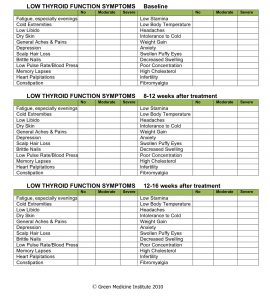ARE YOU BEING TREATED FOR AN UNDERACTIVE THYROID (hypothyroidism), but still don’t feel well?
Despite being prescribed Thyroxine, are you still experiencing weight gain, brain fog, fatigue, depression, dry skin, hair or menstrual problems?
Although medically prescribed Thyroxine may improve some symptoms,
it does not fix the underlying cause. In fact the underlying causes continue and many people continue to struggle with fatigue, mood and weight gain. Many people
often feel progressively worse over time.
This can become very frustrating, especially when your doctor says your blood tests are all fine. Although the medical focus tends to be solely on TSH results, current medical research has shown this to be inadequate.
By looking at more specific measures of thyroid function, such as free T3 and free T4, thyroid antibodies and reverse T3, we can gain a better understanding of your condition.
I recommend these further tests (if not already done) to allow a targeted treatment approach to more effectively treat your thyroid condition.
In addition, we recognise that hypothyroidism is generally caused by an autoimmune condition, although nutrient deficiencies, chemical exposure, chronic stress and hormonal imbalances are also likely to contribute
Another problem is the range of the TSH that is considered normal. In Australia, up to 5 is considered fine, though there is much debate in the medical fraternity as to whether this should be lowered.
In my experience most people with underactive thyroids feel well with a TSH at or below 2.5, with some studies showing a lower quality of life is experienced despite having the same TSH levels as those without thyroid disease.
In fact many medical studies have found that adverse health changes occur once your TSH is above 2.5. (a rising TSH is a sign of slowing thyroid function)
For example
• cholesterol elevations occur in women with PCOS (Polycystic ovarian syndrome) once TSH is above 2.5. (reference, link).
* Higher rates of infertility in women (2 refs)
* Higher levels of obesity, larger waist circumference, insulin resistance and lower good cholesterol (HDL)
A 20 year long English study published in 1995 demonstrated an increased risk for the development of hypothyroidism once TSH exceeds 2.0 mIU/L
In 2003, the US changed their guidelines of TSH 3 as the upper level of normal but then in 2012 changed it back to just over 4 (4.1) .
I think too much time has been spent debating about the degree of thyroid dysfunction, whilst people continue to suffer.
Did You Know?
If you have an autoimmune thyroid condition, it also increases your likelihood of developing many other autoimmune conditions, such as
• type 1 diabetes
• pernicious anemia
• Coeliac disease
• rheumatoid arthritis & lupus and
• Lichen sclerosis to name quite a few
even when taking thyroxine on prescription
By formulating a personalised treatment program that addresses the underlying causes of your condition, you can feel like your old self, get your bounce back, as well as reduce the likelihood of developing other serious health conditions
(All treatments can be taken safely alongside prescription Thyroxine)

References available upon request via email: craigbotanicamedica@gmail.com
08 8271 1827
info@botanicamedica.com.au


Recent Comments